Review for 13 Assassins
Introduction
I watch a lot of discs as a reviewer, a whole lot of cinema, and on occasion I can get to fooling myself, thinking that I have seen it all, have sampled all there is to enjoy in the world of home entertainment. Then a disc arrives that reminds me just how much there is to yet discover, and worse, the inevitability that there is no way that I will get to see everything worth seeing, even if I could somehow live a dozen lifetimes. I haven't seen Sukiyaki Western Django, I haven't seen Ichi the Killer, and I haven't seen Audition. Until the 13 Assassins check disc arrived, I had never seen a single Takashi Miike film, which as someone who appreciates Japanese cinema, is almost a criminal omission. Still, what better place to start than 13 Assassins, Miike's take on the Samurai movie genre, and winner of four Japanese Academy Awards?
It's the middle of the 19th Century, the age of the Samurai is waning, and peace envelops the land during the last days of the Shogunate. But even these pacific days have one last gasp of brutality to them in the form of the Shogun's half brother, Naritsugu. Naritsugu is a psychopathic, vicious, hedonistic embodiment of evil, a man who abuses his position, and the people for his own sick amusement, taking joy in rape, torture, mutilation and murder. Worse, the Shogun insists on Naritsugu being his heir, appointing him to the ruling council. For Sir Doi, that decision is untenable, and when remonstrations are summarily ignored, he weighs his honour and his duty, and decides to do what is best for the nation. He asks the retired samurai Shimada Shinzaemon to assassinate Naritsugu, but Shinzaemon won't be able to do it alone. He sets about recruiting like-minded warriors to assist him, begins to plan the best way to defeat Naritsugu's retinue of guards and assassinate him. But Naritsugu's head retainer is none other than Hanbei Kitou, Shinzaemon's lifelong friend and rival samurai.
Note that this is the international version at 125 minutes, not the 141-minute Japanese domestic release.
Picture
The 2.35:1 widescreen transfer is presented in 1080p, and I couldn't find anything to complain about when it comes to the image. It's a splendid presentation of a feature film, at the correct aspect ratio and frame rate. The image is clear and sharp throughout, with a light and consistent layer of film grain. 13 Assassins is very much a period film, and that comes across in the production design, period detail, and costumes. It also comes across in the film's predilection for natural lighting and a realistic feel. The daytime scenes come across in full clarity, but you'll find that nighttime scenes focus on foreground detail first and foremost, while the background fades into darkness, where detail and structure is practically subliminal. The only thing that lets 13 Assassins down is the practically ubiquitous use of CGI in modern cinema. I know you can't really set bulls on fire and stampede them, but there had to be a better solution than CG.
Sound
You have the choice of DTS-HD MA 5.1 Surround and 2.0 Stereo Japanese, with optional English subtitles. It's not a film that is immediately resonant with surround excess, the music is subdued, the dialogue is clear, and there's more of a subtle ambience to the sound design than anything else. That serves to make the inevitable surround explosion during the climactic action sequence all the more stunning. One of the awards that 13 Assassins achieved was for best sound. You can see Takashi Miike discuss in the interview on this disc, the difficulty of making an extended sword fight sound more than just the clash of two pieces of metal.
Extras
The disc gets a rather unimpressive animated menu; the eyeball thing is a little cheesy.
Among the extras, other than the usual trailer, you'll find 24 minutes of deleted scenes. Given that the domestic version is some 20 minutes longer than the International version, you can guess where they are. You can also see why they are cut. The international version concentrates strongly on the mission, it's pretty dark relentless and brutal, although there are moments of dry wit and black humour. Among the deleted scenes are a fair few minutes of Koyata's character arc, and it's clear from the deletions that his presence in the film really is that of a comic relief. It's in stark contrast to the tone of the story, and while funny in their own right, really would feel out of place in the film. Another important addition in the deleted scenes is the credit scroll. In the film proper, it passes by un-translated, but in the deleted scenes, the actors' names get subtitle translations.
You'll also find a 19-minute interview with Takashi Miike, which is interesting, if a little light on detail. Naturally, you should watch the film first, as there are spoilers here.
Conclusion
It's the simplest of stories. A villain needs dealing with, but the odds are stacked against anyone who would even consider such an idea. To that end, a group of skilled, and motivated warriors are gathered, spend some time in training and male bonding, before displaying their fighting prowess in a battle to the death against ridiculous odds. It's been done countless times before, and no doubt will be done again in the future. But 13 Assassins gets the recipe just right, spending just enough time on the politicking to bring across the import of Shinzaemon's mission, spending sufficient time to bloodily demonstrate just why Naritsugu is deserving of killing, spending a decent amount of time on training and the aforementioned male bonding, developing the characters of the 13 Assassins of the title, and getting us to empathise with some of them. It's a slow build of drama and tension, a gradual escalation of suspense and repressed aggression that eventually erupts in a climactic battle sequence that lasts some 50 minutes. It's bloody brilliant!
Of course the first instinct is to compare 13 Assassins to Seven Samurai, but there is one element missing from 13 Assassins that renders such a comparison pointless. This isn't about the little people, the peasantry joining forces to stand against villainy. This is purely an aristocratic problem, politics that take place high up, when certain elements of the ruling class decide that the heir to the Shogun is unworthy of his position. There's no examination of how the warriors relate to the farmers here, the emphasis is on the warriors alone. In fact, thematically 13 Assassins has more in common with Clint Eastwood's Unforgiven, set during the end of the Shogunate era, a time when the samurai themselves were a dying breed. The leader of the assassins himself, Shinzaemon is spending his retirement fishing, while his nephew Shinrouko spends more time drinking and gambling than he does in the dojo. 13 Assassins is something of an ode to the last of the samurai, although nowhere near as elegiac and measured as Unforgiven is about the gunfighter. This is pure blood and guts action from the first sword swing to the end of the film, with little time for reflection.
That said, the first hour and a bit that is devoted to plot and character development, isn't exactly sufficient time to truly delve into the personalities of all 13 assassins, some of them do fade into the background, and some are barely developed beyond surface detail. In fact, some get more character development in the moment of their death, than they do in the rest of the film. The film really does focus on a central core of five or six characters. Also, I'm somewhat ambivalent about the Koyata character, the 13th assassin that gets recruited on their way to the ambush. He's a scruffy mountain man who's more at home with wielding rocks than swords, and is somewhat akin to Kikuchiyo's character in Seven Samurai. But he's too much the comic relief here, especially in the deleted scenes, and his preternatural imperviousness sits at odds with the rest of the characters. Mind you, it does raise some intriguing questions about his true nature once the credits have stopped rolling.
It's not particularly deep, and 13 Assassins may not have a meaningful message to it, but it is sword-swinging action par excellence, culminating in the most spectacular bloodbath ever committed to celluloid. As a celebration of cinematic violence, this film really is a cut above. If you want something visceral, brutal, and unrelenting, then 13 Assassins is the ideal film.
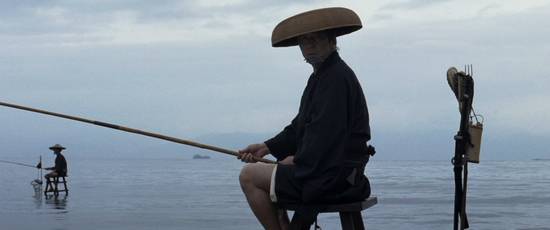
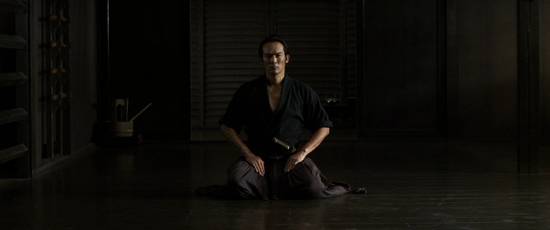
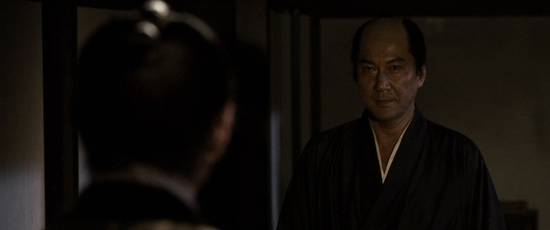
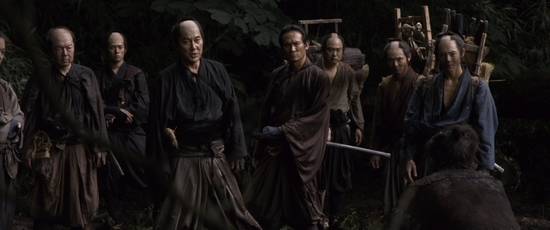
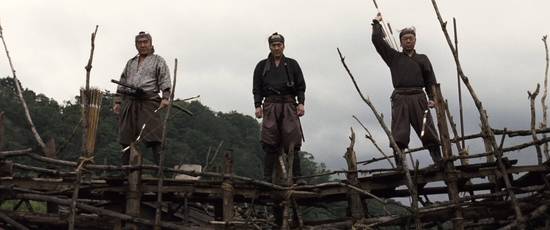
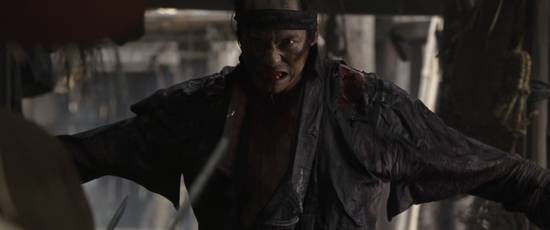
Your Opinions and Comments
Be the first to post a comment!